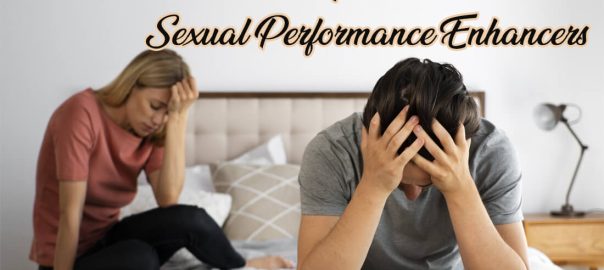
Hormones play a crucial role in regulating various aspects of our sexual health, sexual anxiety performance, and behaviours. Sex hormones are hormones that play a role in regulating sexual development, sexual function, and reproductive processes. There are two main categories of sex hormones: androgens (male hormones) and estrogens (female hormones).
Types of Hormones
The following are some of the hormones that are involved in our sexual health:
1. Testosterone:
Testosterone is a male sex hormone that is produced primarily in the testes in men and in smaller amounts in the ovaries in women. It plays a crucial role in regulating sexual development, sexual function, and overall health acting as an energy booster.
In men, testosterone is responsible for the development of male sexual problems and secondary sexual characteristics, such as increased muscle mass, facial hair, and a deep voice. It also contributes to sexual desire and overall sexual function, including the development of erectile function and sperm production.
Testosterone levels decline naturally with age in every individual, and low levels of testosterone can result in a range of symptoms, including decreased libido, erectile dysfunction, decreased muscle mass, male infertility, and fatigue. In some cases, low testosterone levels can also contribute to osteoporosis, depression, and other health problems.
2. Estrogen:
Estrogen is a female sex hormone that is produced primarily in the ovaries in women and in smaller amounts in the testes in men. It plays a crucial role in regulating sexual development, reproductive processes, and overall health.
In women, estrogen plays a crucial role in regulating the menstrual cycle and supporting pregnancy. It also contributes to the development of female secondary sexual characteristics, such as the growth of breasts and the widening of the hips. It supports sexual desire and overall sexual function.
Estrogen levels decline naturally with age, particularly during menopause, and low levels of estrogen can result in a range of symptoms, including hot flashes, vaginal dryness, and decreased libido. In some cases, low estrogen levels can also contribute to osteoporosis, depression, and other health problems.
Several treatments are available for low estrogen levels, including hormone replacement therapy (HRT), which involves administering estrogen in the form of pills, gels, patches, or injections. HRT can help improve symptoms associated with low estrogen levels, such as hot flashes and vaginal dryness, and support overall health.
3. Progesterone:
Progesterone is a hormone that is produced primarily in the ovaries in women and in smaller amounts in the testes in men. It plays a crucial role in regulating the menstrual cycle and supporting pregnancy.
In women, progesterone helps regulate the menstrual cycle by preparing the uterus for pregnancy and supporting the implantation of a fertilized egg. Increasing progesterone levels during pregnancy sustain it until the placenta develops and produces its own hormones, ensuring stability.
Low levels of progesterone can result in a range of symptoms, including irregular periods, heavy bleeding, and difficulty becoming pregnant. In some cases, low progesterone levels can also contribute to depression, anxiety, and other health problems.
4. Oxytocin:
Often referred to as the “love hormone,” oxytocin is released during sexual activity and promotes feelings of bonding and intimacy between partners. Oxytocin is a hormone and neurotransmitter that is produced in the hypothalamus and released by the pituitary gland. It plays a crucial role in regulating social behavior, sexual behavior, and bonding.
Oxytocin is often referred to as the “love hormone” because it is released in high levels during sexual activity, childbirth, and breastfeeding. It promotes feelings of love, trust, and intimacy, and researchers also believe it plays a role in forming romantic and social bonds.
Oxytocin, beyond its influence on social and sexual behavior, also regulates the menstrual cycle and stimulates uterine contractions during childbirth. It also plays a role in producing milk during breastfeeding and regulating lactation.
Low levels of oxytocin have been linked to a range of mental health problems, including depression, anxiety, and social isolation. Research is ongoing to determine the exact role of oxytocin in mental health and its potential as a treatment for various mental health conditions.
There is some evidence to suggest that oxytocin supplementation can be helpful in certain circumstances, such as in promoting lactation in mothers who are struggling to breastfeed. Yet, oxytocin as a supplement remains experimental; further research is required to ascertain its safety and effectiveness conclusively.
5. Vasopressin:
This hormone governs sexual behavior and is also linked to the formation of social bonds. The hypothalamus produces vasopressin, also known as antidiuretic hormone (ADH), and the pituitary gland releases it. Its primary function is to regulate water balance in the body.
Vasopressin acts on the kidneys to conserve water and reduce urine output, helping to prevent dehydration. It additionally regulates blood pressure through vessel constriction and participates in maintaining electrolyte balance.
A condition known as diabetes insipidus, characterized by excessive thirst and frequent urination, can result from low levels of vasopressin. In contrast, high levels of vasopressin can lead to low blood pressure, dehydration, and other health problems.
Vasopressin also plays a role in various social and behavioral processes, including aggression, pair bonding, and territorial behavior. Research is ongoing to determine the exact role of vasopressin in these processes and its potential as a treatment for various mental health conditions.
In addition to these hormones, sexual wellness medicine as ED medication for other hormones and neurotransmitters, such as dopamine and serotonin, also play a role in regulating sexual behavior and function.
How Are Sex Hormones Produced?
Sex hormones are produced in the endocrine glands of the body, which include the testes in men and the ovaries in women. The hypothalamus and pituitary gland, located in the brain, also play a role in regulating the production of sex hormones.
The hypothalamus in men releases GnRH, prompting the pituitary gland to produce LH and FSH, regulating reproductive functions. LH stimulates the testes to produce testosterone, while FSH stimulates the production of sperm.
In women, the hypothalamus releases GnRH, which stimulates the pituitary gland to produce LH and FSH. LH prompts ovarian estrogen and progesterone production, whereas FSH fosters follicle growth leading to egg release in ovulation.
Disruptions to hormone levels can lead to sexual dysfunction and ed problem.
The Physiological Effect of Sex Hormones:
Sex hormones have a wide range of physiological effects on the body, including:
Sexual development: Androgens and estrogens are pivotal in shaping secondary sexual traits like body hair, voice changes, and muscle development in males. In women, estrogens regulate the menstrual cycle and contribute to the development of breasts and the widening of the hips.
Sexual function: Sex hormones play a crucial role in regulating sexual desire and overall sexual function. Testosterone aids male erectile function and sperm production, while female sexual desire and vaginal lubrication rely on estrogens and progesterone.
Fertility: Sex hormones play a crucial role in regulating reproductive processes, including ovulation and sperm production. In women, estrogens and progesterone control the menstrual cycle and aid pregnancy; in men, testosterone and FSH influence sperm production and fertility.
Bone health: Estrogens play a crucial role in maintaining bone density and reducing the risk of osteoporosis.
Mood regulation: Sex hormones, including testosterone and estrogens, can affect mood and emotional well-being.
Balancing hormones is vital for sexual, reproductive, physical, and emotional well-being, ensuring optimal sexual and reproductive health. Disruptions to hormone levels can lead to sexual dysfunction, infertility, and other health problems.
How Hormones can affect Sex Drive
Hormones play a crucial role in regulating sexual desire, also known as libido. A range of physical, psychological, and social factors influences libido, making it a complex phenomenon. Hormones, however, are some of the most important factors that determine sexual desire in every individual.
In men, the primary hormone that affects libido is testosterone acting as men’s libido booster. The testes produce testosterone, which regulates various sexual and reproductive functions, including sperm production, muscle mass, and sexual desire. Low levels of testosterone can result in reduced libido, erectile dysfunction, and other sexual problem.
In women, the menstrual cycle, pregnancy, and menopause influence the complex hormones that affect libido. Estrogen, progesterone, and testosterone all play a role in regulating sexual desire in women. Low levels of estrogen, for example, can result in vaginal dryness and reduced sexual desire.
Other hormones, such as oxytocin and vasopressin, also play a role in regulating sexual desire and behaviours. Oxytocin, for example, is often referred to as the “love hormone” because it promotes feelings of love, trust, and intimacy can be increased with the help of passion medicine. Vasopressin has been shown to play a role in pair bonding and territorial behavior.
It’s important to note that the relationship between hormones and sexual desire is complex and not fully understood. Factors such as stress, relationship problems, and depression can also play a role in reducing sexual desire.
If you’re experiencing reduced sexual desire or other sexual problems, it’s important to speak with a healthcare provider and get ayurvedic treatment for premature ejaculation
Your provider can help determine the underlying cause and develop an appropriate treatment plan, which may involve hormone replacement therapy, lifestyle changes, or other treatments like medicine for sexual weakness
Conclusion:
In conclusion, hormones play a crucial role in regulating various aspects of our sexual health and behaviour. A healthy balance of hormones is essential for optimal sexual function and satisfaction as they act as a stamina booster. If you’re experiencing sexual problems like ejaculatory disorder, it’s important to speak with a healthcare provider to determine the underlying cause and get ayurvedic medicine for erectile dysfunction










